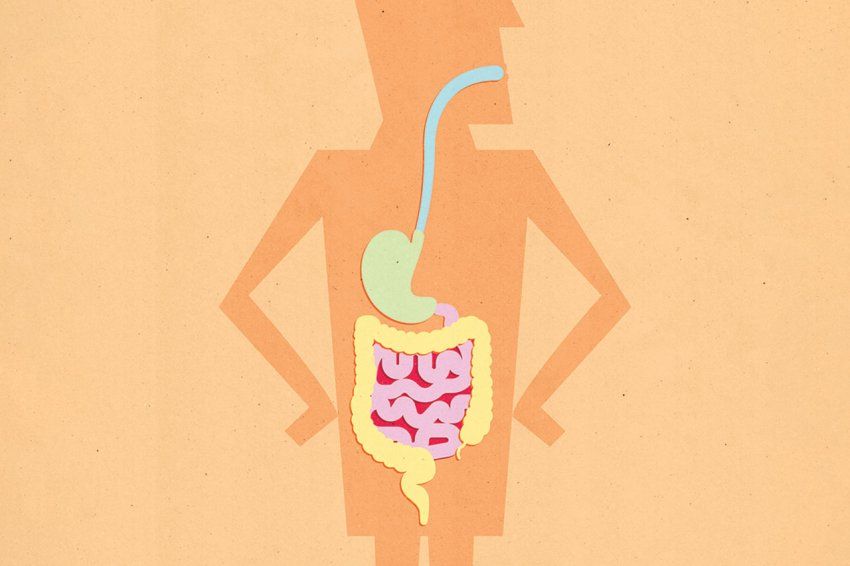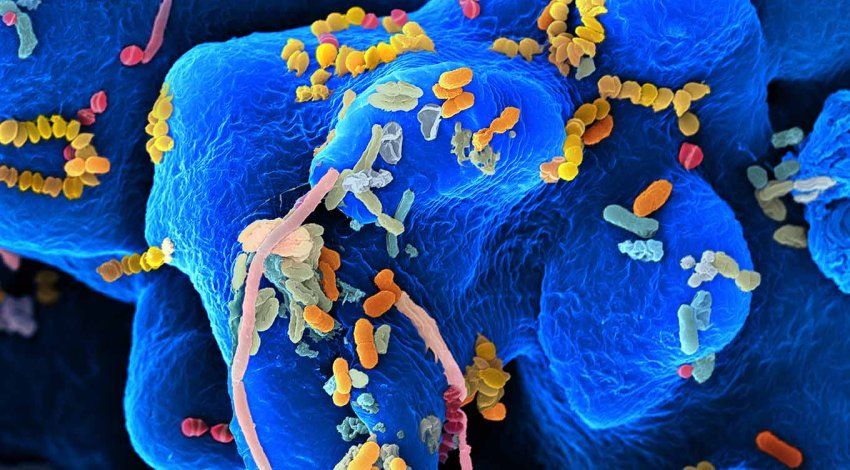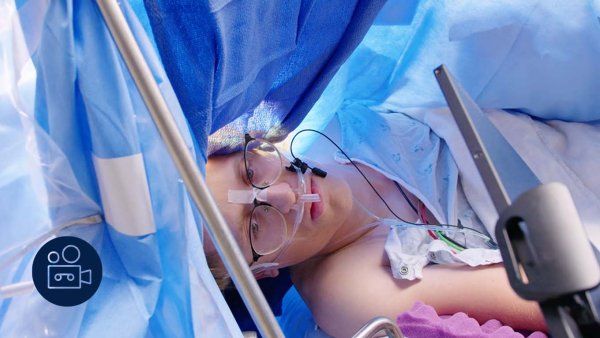
10 Ways UCSF Is Exploring the Gut
Scientists at UCSF are studying the gastrointestinal tract to unlock the healing secrets of our trillions of gut microbes.
Decoding bacteria’s role in multiple sclerosis
Significant differences exist between the gut bugs of MS patients and those of healthy people. Newly identified bacteria may play a role in inflammation and energy production, which could influence how MS develops and responds to treatment.
What if gut health influenced mood?
Scientists are looking into the gut microbiomes of individuals with depression before and after they receive treatment. They’re searching for bacterial molecules that increase when people’s mood improves, potentially inspiring new therapies that combine probiotics with traditional antidepressants.
Keto may K.O. autoimmunity
A ketogenic diet, low in carbs and high in fats, may not only prompt weight loss but also help reduce inflammation from autoimmune disorders by altering gut bacteria. The ketone bodies promoted by a “keto” diet could offer new ways to manage autoimmune conditions.
Can a poop transplant heal IBD?
Fecal microbiota transplants (FMT) are emerging as a treatment for inflammatory bowel disease (IBD). By transferring stool from healthy donors to IBD patients, FMT restores the recipients’ gut bacteria balance. Antibiotics can boost the procedure’s success, and capsule-based FMT is being explored for convenience.
UCSF findings could guide treatments for:
Asthma: A link exists between the gut microbiome and childhood risk of asthma. Scientists aim to reduce this risk by precisely modifying asthma-causing genes in the microbiome without disturbing its beneficial functions.
Skin disorders: For colitis patients, gut inflammation may trigger skin problems by causing the immune system to mistakenly attack harmless skin bacteria.
Obesity and diabetes: Gut bacteria can vary significantly between ethnic groups, which might explain why some people gain weight differently, even on similar diets.
Osteoporosis and osteoarthritis: Studies in mice suggest that disruptions in gut health, such as from long-term antibiotic use, can lead to weaker bones.
Colon cancer: Certain gut microbes, including E. coli, can activate or deactivate chemotherapy drugs for colon cancer, impacting their effects.
STIs: Taking doxycycline after high-risk sexual encounters, a preventive therapy known as doxy-PEP, significantly reduces sexually transmitted infections (STIs) but may affect the gut microbiome.

Decoding bacteria’s role in multiple sclerosis
Significant differences exist between the gut bugs of MS patients and those of healthy people. Newly identified bacteria may play a role in inflammation and energy production, which could influence how MS develops and responds to treatment.
What if gut health influenced mood?
Scientists are looking into the gut microbiomes of individuals with depression before and after they receive treatment. They’re searching for bacterial molecules that increase when people’s mood improves, potentially inspiring new therapies that combine probiotics with traditional antidepressants.
Keto may K.O. autoimmunity
A ketogenic diet, low in carbs and high in fats, may not only prompt weight loss but also help reduce inflammation from autoimmune disorders by altering gut bacteria. The ketone bodies promoted by a “keto” diet could offer new ways to manage autoimmune conditions.
Can a poop transplant heal IBD?
Fecal microbiota transplants (FMT) are emerging as a treatment for inflammatory bowel disease (IBD). By transferring stool from healthy donors to IBD patients, FMT restores the recipients’ gut bacteria balance. Antibiotics can boost the procedure’s success, and capsule-based FMT is being explored for convenience.
UCSF findings could guide treatments for:
Asthma
A link exists between the gut microbiome and childhood risk of asthma. Scientists aim to reduce this risk by precisely modifying asthma-causing genes in the microbiome without disturbing its beneficial functions.
Skin disorders
For colitis patients, gut inflammation may trigger skin problems by causing the immune system to mistakenly attack harmless skin bacteria.
Obesity and diabetes
Gut bacteria can vary significantly between ethnic groups, which might explain why some people gain weight differently, even on similar diets.
Osteoporosis and osteoarthritis
Studies in mice suggest that disruptions in gut health, such as from long-term antibiotic use, can lead to weaker bones.
Colon cancer
Certain gut microbes, including E. coli, can activate or deactivate chemotherapy drugs for colon cancer, impacting their effects.
STIs
Taking doxycycline after high-risk sexual encounters, a preventive therapy known as doxy-PEP, significantly reduces sexually transmitted infections (STIs) but may affect the gut microbiome.




